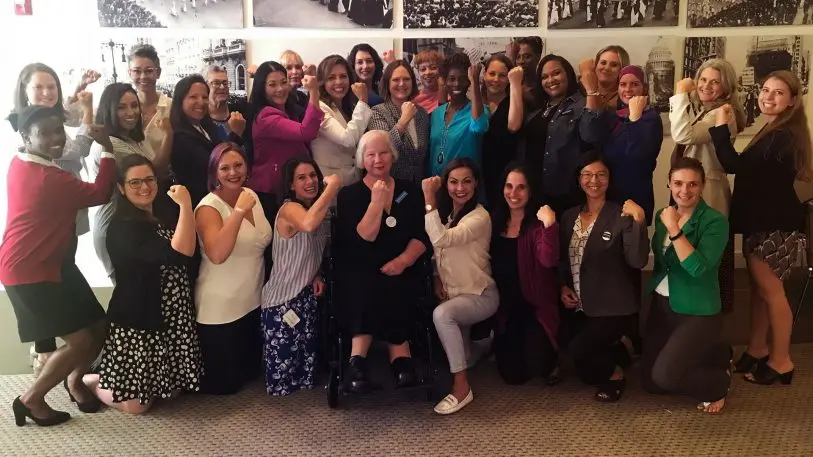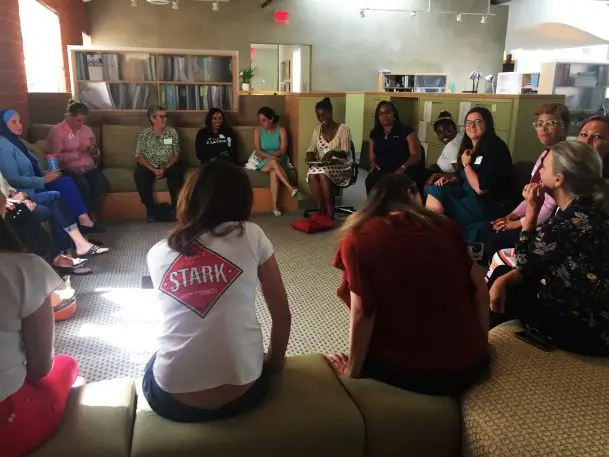“What would prevent a person from voting for you?” asks my instructor. “Write it down, because we’re going to get to it later.”
I’m at Emerge America Bootcamp for first-time female Democratic candidates. I’m surrounded by 25 women as a medley of instructors teach them how to run a campaign, fundraise, talk to the media, and reply to difficult questions from potential constituents. Situated at the Feminist Majority Foundation in Beverly Hills, it looks like a private school classroom—brick walls, muted carpets, colored markers, and all.
All around the room hang drawings by the group of what inspired them to be here. The images range from exuberant (stick figures waving American flags or standing on Capitol Hill) to the tragic (crying beside caskets or fleeing burning homes). They are like modern-day cave drawings.
The attendees are a melting pot of multigenerational women, ranging in age from their mid-20s to early 70s. More than 40% are women of color. They are running for positions at every level: state legislator, senate, city council, city auditor, district attorney, and more.
Throughout our eight-hour day֫—the second of three—the women jot down instructors’ talking points, share their experiences, and ask advice. How, for example, does one approach messaging for districts with wildly varying income levels? Is there a way to delicately handle issues like homelessness without offending one group?
Between sessions, the women wander the room, forming fast friendships with their fellow recruits and share war stories from their unique home fronts. The lively chats make it difficult for the seminar organizer to get everyone back to their seats.
That is, until the next speaker—Tustin, California, city council member Letitia Clark—commands the room to discuss nitty gritty organizing details like the importance of keeping meticulous financial records. Emerge attendees also want to know about the personal—issues that women uniquely face, like sexism.
“A response I get a lot is: If you have kids, how will you have time?” says Clark, a mom of middle-school twins. “Play it to your advantage: Adversity makes you a stronger candidate.”
The class nods in gratitude, some of them nudging and whispering in their neighbor’s ear as if to say, yep, I’ll do that.

[Photo: courtesy of Emerge America]
Class is in session
In the last 13 years, Emerge America has trained more than 4,000 women. In 2018, over 760 Emerge alum are on the ballot. Most recently, alum London Breed became San Francisco’s 45th mayor. In Virginia’s recent election, nine out of the 15 seats flipped in the House of Delegates were Emerge alums.
“The minute the [2016 presidential] election happened, women just started calling and emailing us,” says Emerge founder Andrea Dew Steele.
And history (or rather herstory) is being made: At least 185 women from both parties have been nominated to run for U.S. House seats in the November midterms.
Many felt an urgent need to combat what they felt were significant risks to long-held women’s healthcare issues, like abortion or birth control.
Others, like attorney and civil rights activist Deedra Abboud, take issue with the treatment and rhetoric surrounding marginalized communities. The way politicians talked negatively about minority constituents was filtering down, she says, and not enough elected officials fired back.
So, she decided to run for the Dem party nomination for the U.S. Senate seat being vacated by Jeff Flake in Arizona.
“I said, ‘No, I can do better. I can raise the expectation of this office,” says Abboud, who later lost her primary bid on August 28 to another woman, U.S. Representative Kyrsten Sinema (D-AZ). (Sinema’s Republican opponent this fall, incidentally, is also a woman—Martha McSally.)
At the pre-primary bootcamp, Abboud described her unique road trip—she put 50,000 miles on her car in 16 months—to speak with voters. Like many of her Emerge peers, Abboud ran without going through standard party leadership channels.
“This year, people didn’t ask for permission [to run],” she says. “So that changed everything.”
Former schoolteacher and consultant Marlys Davidson, 67, came out of retirement to run for the Los Alamitos School Board in northern Orange County, California. The energetic contender concedes she could be fulfilling her bucket list, like learning how to surf. Instead, she’s taking notes on how to best utilize Facebook.
“I told my kids: If you really care about this country, then it isn’t enough to just put on your tennis shoes and march, because I’ve marched and marched and marched,” says Davidson. “You need to engage.”
And while the bootcamp’s mission is to train first-time candidates, a portion of attendees are already well versed in political life. Eleni Kounalakis, former U.S. Ambassador to Hungary under President Barack Obama, doesn’t necessarily need Politics 101 as she runs for California lieutenant governor (a position previously never held by a woman). Still, the San Francisco resident says it never hurts to keep up with things like the latest communication strategies taught by Emerge.
Then there’s also the Emerge network, a sisterhood of sorts, she says. Emerge candidates and alumni routinely call on one another, be it for fundraising help or endorsements, even social media tips. Over 500 Emerge alumnae hold office.
“It’s the sidebar conversations that give you the opportunity for great insight,” Kounalakis says.
A recurring theme at Emerge are hurdles to building a war chest. Women, Kounalakis notes, historically receive less donations than men. “And so you get the stories as to why [that happens], and you share ideas for how to be more successful.”
For whatever reason, some female candidates shy away from the task. The Emerge program reinforces the idea that “they’re not asking for themselves,” but rather for what they believe in, stresses Steele. “Get over that.”
Where were the women?
Steele spent most of her career as a political analyst in D.C. and served as an adviser to Democratic activist and Esprit clothing cofounder Susie Tompkins Buell. Her come-to-politics moment was the election in 2000 of the GOP’s George W. Bush.
Steele started with local San Francisco politics. At the time, the progressive city had only two female political supervisors, a statistic she found “shocking.”
When a friend decided to launch a bid for office, Steele helped type up her bio and digitally organized her rolodex. She even ordered the friend a PalmPilot (remember those?). It was then that Steele realized how hard it was for someone to figure out the very basics of a campaign.
“I thought: Maybe this is one of the reasons we don’t have more women running for office,” says Steele.
Steele organized her pal’s initial campaign basics–what would become the training principles of Emerge America.
The friend went on to win her race. In fact, she ran for district attorney and then attorney general.
“Now she’s our senator in California,” laughs Steele. “Her name is Kamala Harris.”
Women, now more than ever, understand the nexus between politics and change, she continues. For years, they either didn’t want to run or felt daunted by the process. Some found politics too cutthroat or believed there were better ways to give back to the community.
“They often think, ‘Oh, I can just work in a nonprofit,'” says Steele. “It’s a series of conversations so that they understand you can effect real change by entering the political arena.”
Since the 2016 election, more women have felt motivated to throw their names in the ring, but Steele believes we’re nowhere near satisfactory equality. The U.S. ranks 100th in the world in terms of women’s representation in government, with women holding less than 20% of elected offices. Women currently constitute just 24% of the candidates running, while positions such as governor are 80% male.
“We were completely out of power at every single level,” says Steele. “We better focus on state legislatures, secretary of states, attorney generals . . . all of these kinds of races that are so important.”

Nuts and bolts
In 2005, Steele founded Emerge with a focus on recruitment, training, and networking. The organization’s signature program spans six months in which recruits spend one weekend a month learning in-person. (The bootcamp, meanwhile is a more condensed three-day version.)
Tuition ranges across states from $500-$1,500, although scholarships and payment plans are available. Sometimes, a candidate’s community covers the cost. Recently, a woman’s church in Kentucky sponsored her training.
The curriculum focuses heavily on communication and how candidates can best present their platform and goals to voters. “If you can’t connect as a candidate, you can’t win,” notes Steele.
There’s also an overview of the Democratic Party along with the nuts and bolts of organizing and running a campaign: Setting a budget, talking to the media, public speaking and debate, fundraising, endorsements, and creating an action plan they can use after graduation.
Emerge’s alumnae and elected officials serve as their top recruiters, often nominating women they believe to be potential leaders. The organization also conducts its own recruitment process, focusing on specific races it deems important in the upcoming cycle.
While Emerge does not have a formal affiliation with the Democratic National Committee–it’s a standalone nonprofit political organization–it does work closely where possible. “They really value the work we do, because you can’t win races if you don’t have good candidates,” she says.
The Republican party does have similar programs for female candidates, though not on the same intensive level, says Steele.
Emerge emerges
Davidson concedes she was, at first, rather intimidated to join a room full of women, most of them noticeably younger. Having spent her entire career fighting to have a seat at the table, she was astounded by the confidence and sense of self the younger generations possess.
But by day two, Davidson found herself connecting with the others—and learning from one another, comparing campaign notes and experiences with new friends. “There’s no hierarchy here,” she remarks.
Thema Bryant-Davis, running for Canoga Park, California’s neighborhood council, says she was inspired by the diversity and plans to keep in touch. “You see the commonality, even with the differences,” says Bryant-Davis.
By the end of the day, the bootcamp graduates were exchanging numbers and snapping Instagram shots. Dinner plans were made and visits scheduled. And there were hugs.
This is how the sisterhood grows stronger.
The issue now is how to keep up with increasing demand. In the last few years, Emerge expanded to more regions and can now be found in 25 states. Seven states were added since the 2016 election.
This year’s Emerge numbers have proven particularly successful: In 2018, Emerge alumni’s election win rate hovers around 73%. Already 67 Emerge women out of 92 won their general election races, while 202 emerge women out of 279 won their primary races.
Emerge plans to have a presence in all 50 states by 2020 to make sure there’s not a single woman in the U.S. who wants to run for office who doesn’t have access to quality training, says Steele. She sees a newfound passion for politics, and the mission is to nourish and sustain that. For long-term change, women need to keep the fire burning, she says.
“Our model is not to just come in before an election, and not about any one campaign. It’s about building a movement,” says Steele. “We have a lot of work to do.”
Recognize your brand’s excellence by applying to this year’s Brands That Matter Awards before the early-rate deadline, May 3.
